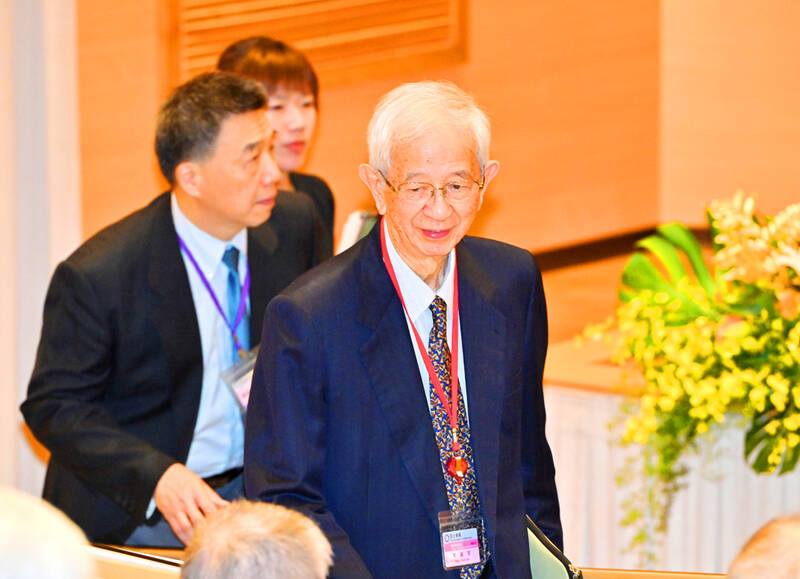Former Academia Sinica president Lee Yuan-tseh (李遠哲) yesterday said that he has accepted President William Lai’s (賴清德) invitation to serve as a consultant on his National Climate Change Strategy Committee, adding that he agreed with proposals to continue using nuclear energy.
The committee was one of three established one month after Lai took office on May 20, along with the Whole-of-Society Defense Resilience Committee and the Healthy Taiwan Promotion Committee.
Pegatron Group (和碩集團) chairman Tung Tzu-hsien (童子賢), who supports the use of nuclear energy, has been retained by the president to serve as the deputy convener of the climate change committee.

Photo: Tien Yu-hua, Taipei Times
Many have perceived the appointment as a significant shift from the “nuclear-free homeland” policy, which the president’s Democratic Progressive Party (DPP) has been espousing for decades.
Lee, 87, told political commentator Huang Kuang-chin (黃光芹) on her online talk show that he accepted Lai’s invitation because he had participated in many net zero emissions meetings around the world and felt obligated to inform the public about the importance of tackling challenges wrought by global warming and greenhouse gas emissions.
That more than 1,000 people died during the pilgrimage to Mecca this year shows that rising global temperatures could gradually turn the Earth into a place that is unfit for human habitation, the Nobel laureate in chemistry said, adding that humans would not survive natural disasters should global temperatures rise by 3°C.
“If we are not actively reducing carbon and greenhouse gas emissions, we could become extinct like the dinosaurs,” Lee said, adding that this is the view of a responsible scientist, rather than exaggerated statements from an alarmist.
The nation’s goal of zero carbon emissions by 2050 cannot be met if the government fails to cut emissions by 50 percent by 2030, he said.
“Nuclear energy still has its disadvantages given the current level of technology, but the potential disasters that it could bring cannot compare with the complete destruction of the human race,” Lee said.
“What Tung said is what he truly believes in, and he expressed his support for nuclear energy as an entrepreneur and from a scientific perspective. The position has made him a target of criticism, but he is heading in the right direction,” he added.
Lai also knows that the reform is necessary for society to change, but he is under a lot of pressure to make the first step, Lee said.
Given the size and density of Taiwan’s population, the nation cannot sustain itself by simply using renewable energy to replace the use of fossil fuels without using nuclear energy, or extending the use of existing nuclear power plants, Lee said.

SECURITY: As China is ‘reshaping’ Hong Kong’s population, Taiwan must raise the eligibility threshold for applications from Hong Kongers, Chiu Chui-cheng said When Hong Kong and Macau citizens apply for residency in Taiwan, it would be under a new category that includes a “national security observation period,” Mainland Affairs Council (MAC) Minister Chiu Chui-cheng (邱垂正) said yesterday. President William Lai (賴清德) on March 13 announced 17 strategies to counter China’s aggression toward Taiwan, including incorporating national security considerations into the review process for residency applications from Hong Kong and Macau citizens. The situation in Hong Kong is constantly changing, Chiu said to media yesterday on the sidelines of the Taipei Technology Run hosted by the Taipei Neihu Technology Park Development Association. With

A US Marine Corps regiment equipped with Naval Strike Missiles (NSM) is set to participate in the upcoming Balikatan 25 exercise in the Luzon Strait, marking the system’s first-ever deployment in the Philippines. US and Philippine officials have separately confirmed that the Navy Marine Expeditionary Ship Interdiction System (NMESIS) — the mobile launch platform for the Naval Strike Missile — would take part in the joint exercise. The missiles are being deployed to “a strategic first island chain chokepoint” in the waters between Taiwan proper and the Philippines, US-based Naval News reported. “The Luzon Strait and Bashi Channel represent a critical access

‘FORM OF PROTEST’: The German Institute Taipei said it was ‘shocked’ to see Nazi symbolism used in connection with political aims as it condemned the incident Sung Chien-liang (宋建樑), who led efforts to recall Democratic Progressive Party (DPP) Legislator Lee Kun-cheng (李坤城), was released on bail of NT$80,000 yesterday amid an outcry over a Nazi armband he wore to questioning the night before. Sung arrived at the New Taipei City District Prosecutors’ Office for questioning in a recall petition forgery case on Tuesday night wearing a red armband bearing a swastika, carrying a copy of Adolf Hitler’s Mein Kampf and giving a Nazi salute. Sung left the building at 1:15am without the armband and apparently covering the book with a coat. This is a serious international scandal and Chinese

COUNTERINTELLIGENCE TRAINING: The ministry said 87.5 percent of the apprehended Chinese agents were reported by service members they tried to lure into becoming spies Taiwanese organized crime, illegal money lenders, temples and civic groups are complicit in Beijing’s infiltration of the armed forces, the Ministry of National Defense (MND) said in a report yesterday. Retired service members who had been turned to Beijing’s cause mainly relied on those channels to infiltrate the Taiwanese military, according to the report to be submitted to lawmakers ahead of tomorrow’s hearing on Chinese espionage in the military. Chinese intelligence typically used blackmail, Internet-based communications, bribery or debts to loan sharks to leverage active service personnel to do its bidding, it said. China’s main goals are to collect intelligence, and develop a